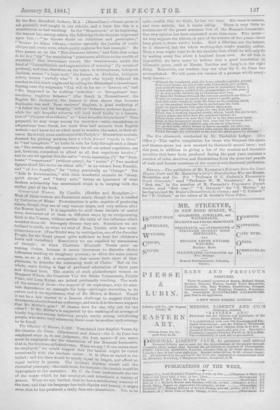Consecrated Women. By Claudia. (Hodder and Stoughton.)— Most of these
women are Protestaut saints, though the list is headed by Catherine of Slane. Protestantism is quite capable of producing saints, though they are of very various types, and very seldom after the Roman model. It is impossible to road these records of useful lives, dominated all of them in different ways by an overpowering faith in the Unseen, without seeing the unity of the influence which moulded them all. Strangely diverse they aro. Sometimes wo are inclined to smile, as when we read of Fran Trfidel, with her semi• miraculous cow. (Frau Triidel was, by anticipation, one of the Peculiar People, for she found prayer quite sufficient to heal her children's hurts and maladies.) Sometimes we are repelled by narrowness of thought ; as when Charlotte Elizabeth Tonna gave up writing fiction, because it seems irreverent to describe divine influences working on imaginary persons ; or when the same person 118", as on p. 101, a comparison that scorns little short of blas- phemous, to describe the redeeming work of Christ. But on the whole, one's feeling is that of profound admiration of these pure and devoted lives. The stories of such philanthropic women as Margaret Wilson, the Countess Von dor Rocks Volmerstoin, Fidelia Fiske, and Lena Huber, are indeed profoundly touching. The work of the second of these—the support of an orphanage, with its abso- lute dependence on unsought-for help—strikingly resembles, in its nature and in its experienCes, that of Mr. Muller, at Bristol. Would' it not be a fair answer to a famous challenge to suggest that the Secularists should found an orphanage, mid leave it to the same support that Mr. Mtiller's gets ? If chance does for one, why not for the other ? If Mr. Mtiller's is supported by the working of an average of kindly impulses among believing people, surely among unbelieving
people, who seem very numerous, to be found. there must be another such average


































 Previous page
Previous page